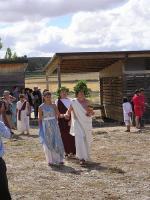My university’s summer class schedule is rather thin, and I’ve ended up taking my first online course. Looking back over the past weeks, I find that have learned two (2) things from this course: first, online courses are bollocks; second, I loathe academic software engineering.
I am deeply unimpressed by the “online class” experience. Perhaps the specimen to which I am currently being subjected is an unrepresentative sample, but I have to say it is woefully inferior to even a very bad classroom-taught (or “traditional”, as it is quaintly called) course. The “teaching” has been reduced to a few irregularly posted PowerPoint decks; I have no concept of who the teacher might be or if he is actually competent. Interaction with classmates is limited to that strictly necessary to complete assignments. There is little sharing of experience and less camaraderie.
We are required to use inferior web forum software for all course-related activities. This software lacks even rudimentary notification abilities, so one has to check several times each day to see if anything new has been posted (which it usually hasn’t). It logs one out after fifteen minutes, so every post is an exercise in frustration. It pops up dialog boxes with unhelpful diagnostic information every single, bloody login. It re-implements email! Even the teacher and T.A. can’t seem to use the “helpful class-management features” of the software to get grades posted properly, sometimes requiring three attempts. While the T.A. seems to be a reliable enough person, the overall impression of the course is of inferior technology and desultory disorganization.
Perhaps the state of online classes will be improved in five years; this one certainly does not seem to be ready for prime time. I’m seven or eight weeks into this course, and I could have learned just as much spending two days with Google Scholar and a list of a half-dozen seed papers (with much less exasperation and a far smaller outlay of cash).
The course topic (software testing) has not much helped my enthusiasm for this lackadaisical flapdoodle. This is the first software engineering course I’ve taken, and I have to say that it’s not doing a lot for me. The several dozen papers I’ve read are shining exemplars of Sturgeon’s Law. There are few interesting bits buried in the crud, but these are, by and large, derivative of more basic computer science results.
Don’t get me wrong; software engineering is a valuable (and, I assume, more practical than it seems from this course) discipline, but I’m deuced certain that I’ll be spinning my thesis topic in a much different direction.

 Nova Roma is more than a historical recreation society, although we are that. We are more than a pagan religious organization, although we are that, too. We are more than a classical studies group, but that falls within our purview as well. We are nothing less than a sovereign nation; an attempt to re-create the best of classical pagan Rome (with a few compromises to modern times), and we invite you to join us by applying for
Nova Roma is more than a historical recreation society, although we are that. We are more than a pagan religious organization, although we are that, too. We are more than a classical studies group, but that falls within our purview as well. We are nothing less than a sovereign nation; an attempt to re-create the best of classical pagan Rome (with a few compromises to modern times), and we invite you to join us by applying for 